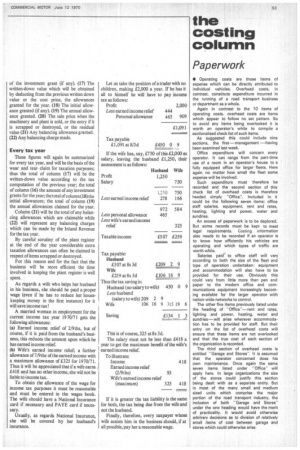the costing column
Page 55

If you've noticed an error in this article please click here to report it so we can fix it.
Paperwork
• Operating costs are those items of expense which can be directly attributed to individual vehicles. Overhead costs, in contrast, constitute expenditure incurred in the running of a road transport business or department as a whole.
Again in contrast to the 10 items of operating costs, overhead costs are items which appear to follow no set pattern. So to avoid any items being overlooked it is worth an operator's while to compile a sectionalized check list of such items.
As suggested this could include nine sections, the first—management — having been examined last week.
Office expenditure will concern every operator. It can range from the part-time use of a room in an operator's house to a fully equipped office for larger fleets. Here again no matter how small the fleet some expense will be involved.
Such expenditure must therefore be recorded and the second section of this check list of overhead costs is therefore headed simply "Office". Included in it could be the following seven items: office staff salaries, equipment, rent and rates. heating, lighting and power, water and sundries.
An excess of paperwork is to be deplored. But some records must be kept to meet legal requirements. Costing information also needs to be recorded if an operator is to know how efficiently his vehicles are operating and which types of traffic are worth while.
Salaries paid to office staff will vary according to both the size of the fleet and type of operation undertaken: equipment and accommodation will also have to be provided for their use. Obviously this could vary from little more than pen and paper to the modern office and communications equipment increasingly becoming available for the larger operator with nation-wide networks to control.
The other five items previously listed under the heading of " Office"— rent and rates. lighting and power, heating, water and sundries—will arise wherever accommodation has to be provided for staff. But their entry on the list of overhead costs will ensure that these items are not overlooked and that the true cost of each section of the organization is recorded.
The third section of overhead costs is entitled "Garage and Stores". It is assumed that the operator concerned does his own maintenance. Once again the same seven items listed under "Officewill apply here. In large organizations the size of the stores could justify this section being dealt with as a separate entity. But in most of the many small and medium sized units which comprise the major portion of the road transport industry, the inclusion of both "Garage and Stores" under the one heading would have the merit of practicality. It would avoid otherwise arbitrary decisions as to division of relatively small items of cost between garage and stores which could otherwise arise.
























































































































